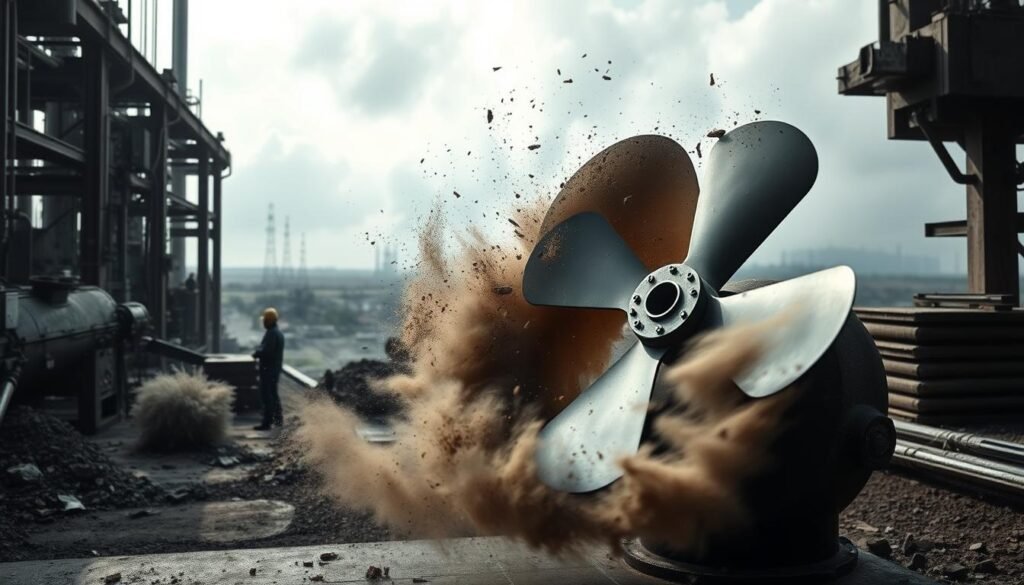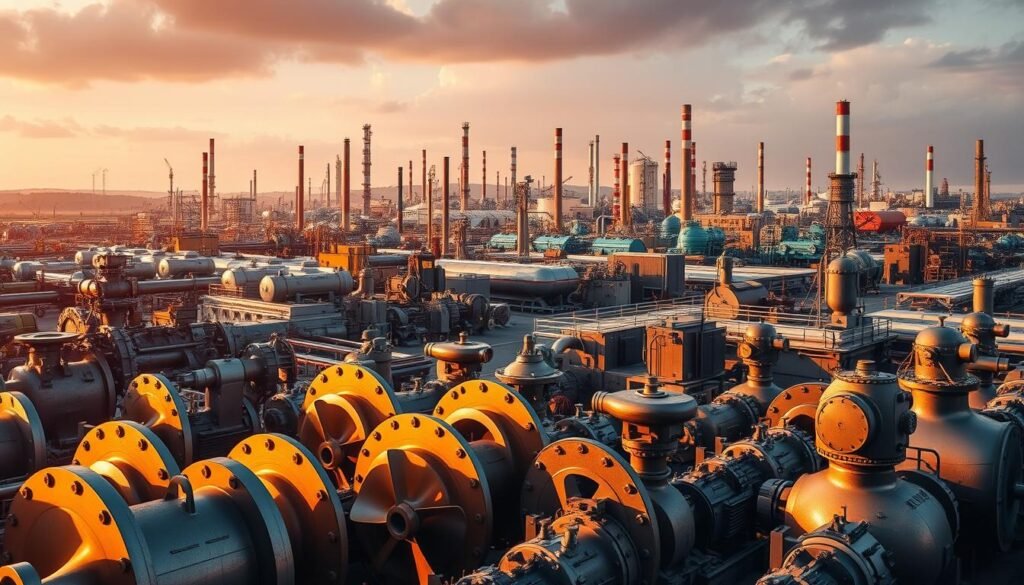Choosing the right material for impellers is key in industrial settings. Impeller metals have long been the go-to, but composite impellers are becoming more popular. They offer unique benefits that can change how industries work.
Impeller metals and composite impellers affect industrial processes differently. Composite impellers are lighter and resist corrosion well, which is great for some jobs. Impeller metals, though, are strong and last long, perfect for tough tasks.
Deciding between impeller metals and composite impellers depends on the industry’s needs. Industries should think about performance, upkeep, and how green they want to be. We’ll look at what each material offers and their pros and cons in different settings.
Understanding Industrial Impeller Materials
Industrial impellers are key in many areas, like pumps, fans, and turbines. The material choice is very important. It impacts how well they work, how long they last, and how easy they are to maintain. Key traits like strength, resistance to corrosion, and energy use are crucial.
Metal impellers are common and include stainless steel, aluminum, and copper. These are strong, resist corrosion well, and use energy efficiently. Zum Beispiel, stainless steel is often used in chemical and water treatment because it doesn’t corrode easily.
Common Metal Impeller Types
- Edelstahl: Offers high corrosion resistance and strength
- Aluminum: Provides excellent energy efficiency and lightweight properties
- Copper: Exhibits high thermal conductivity and corrosion resistance
Introduction to Composite Impellers
Composite impellers mix materials like carbon fiber, glass fiber, and polymers. They are lighter, resist corrosion better, and use energy more efficiently than metal ones. They’re great for places where weight and corrosion resistance matter a lot, like the sea and chemical plants.
Material Properties Overview
| Material | Korrosionsbeständigkeit | Energieeffizienz |
|---|---|---|
| Edelstahl | Hoch | Medium |
| Aluminum | Medium | Hoch |
| Zusammengesetzt | Hoch | Hoch |
Performance Characteristics of Impeller Metals
Impeller metals are key in many industries because they perform well. They handle high speeds, pressures, and temperatures well. This makes them perfect for chemical processing, water treatment, and more.
These metals have a high strength-to-weight ratio, resist corrosion, and can handle extreme temperatures. This lets them work well in tough industrial settings. Zum Beispiel, in chemical plants, they must face corrosive substances and high heat. In water treatment, they need to resist corrosion and work at high speeds.
Impeller metals are used in many fields, including:
- Chemical processing
- Water treatment
- Maritime
- Power generation
They are chosen over other materials because of their great performance. This helps them work efficiently and effectively in these areas.
Using impeller metals in industries brings many benefits. It improves efficiency, cuts down on maintenance costs, and boosts productivity. But, it’s important to check their performance to make sure they fit each industry’s needs.
Key Benefits of Composite Impellers
Composite impellers have many advantages over metal ones. They are lighter, which means they use less energy and work more efficiently. This is great for many industrial uses.
They also resist corrosion better, lasting longer in harsh conditions. This is key in places where chemicals or seawater are present. Plus, their light weight and design help save energy.
Weight Reduction Advantages
- Reduced energy consumption
- Increased efficiency
- Lower operating costs
Corrosion Resistance Properties
Composite materials don’t corrode easily, making them perfect for tough spots. They last longer and need less upkeep. Auch, they can be made to use less energy, saving money and the planet.
Energy Efficiency Factors
Composite impellers can be made to save energy. This means less cost and less harm to the environment. By using them, industries can do better and be kinder to our planet.
Environmental Impact and Sustainability Comparison
The choice of material for impellers in industrial operations is crucial for the environment. Sustainability is key, covering production and disposal or recycling. Composite impellers are better for the environment than metal ones, needing less energy to make and can be recycled.
Metal impellers need a lot of energy and resources, causing more pollution. On the other hand, composite impellers use recycled materials and need less energy to produce.

- They use less energy to make
- They produce fewer greenhouse gases
- They can be recycled, reducing waste
- They help protect the environment
In summary, choosing the right material for impellers is vital for the environment. Composite impellers are a greener option than metal ones. As companies focus more on being green, composite impellers will likely be used more.
| Material | Energy Consumption | Greenhouse Gas Emissions | Recycling Potential |
|---|---|---|---|
| Metal | Hoch | Hoch | Niedrig |
| Zusammengesetzt | Niedrig | Niedrig | Hoch |
Cost Analysis: Initial Investment vs. Long-term Value
Choosing between metal and composite impellers requires a detailed cost analysis. Composite impellers might cost more upfront, but they offer long-term savings. It’s important to look at the total cost, including maintenance and replacement expenses.
Composite impellers can save energy, which is a big plus. They are lighter and more efficient, leading to lower energy bills over time. This can greatly reduce the cost of using the impeller. Plus, they need less maintenance, which saves money too.
- Purchase price: The initial cost of the impeller, including materials and manufacturing costs.
- Maintenance costs: The costs associated with maintaining and repairing the impeller over its lifespan.
- Energy savings: The potential for energy savings with composite impellers, which can reduce the long-term costs of operation.
Businesses should weigh these factors carefully. While composite impellers might cost more at first, they can save money in the long run. A detailed cost analysis helps decide which option is more cost-effective for a specific use.
Industry-Specific Applications and Requirements
Choosing the right impeller material is key in different industries. Each field has its own needs, and the right material can greatly improve performance. Zum Beispiel, in chemical processing, it’s vital to resist corrosive chemicals. Composite impellers are often chosen here because they’re very resistant to corrosion and can handle tough chemical environments.
In water treatment, composite impellers are also a popular choice. They resist corrosion well and can handle the tough demands of water treatment. They’re also used in maritime settings, where they face saltwater and other corrosive substances. Their durability and resistance to corrosion make them perfect for these areas.
Chemical Processing Needs
Metal impellers can be a problem in chemical processing because they corrode easily. But composite impellers are a reliable and efficient option. They’re made to last in the harsh chemical environments of processing plants, and their corrosion resistance means they last a long time.
Water Treatment Solutions
In water treatment, composite impellers are crucial. They’re built to handle the tough conditions of water treatment, including harsh chemicals and high pressures. They also resist corrosion, which is important in water treatment where corrosion is a big risk.

Maritime Applications
In maritime settings, composite impellers are often used. They’re made to withstand the tough marine environment, including saltwater and corrosive substances. They’re also lightweight and durable, making them great for maritime use where weight and efficiency matter.
| Industry | Impeller Material | Key Benefits |
|---|---|---|
| Chemical Processing | Zusammengesetzt | High resistance to corrosion, durable, and efficient |
| Water Treatment | Zusammengesetzt | Resistant to corrosion, durable, and efficient |
| Maritime | Zusammengesetzt | Lightweight, durable, and resistant to corrosion |
Maintenance and Durability Factors
When it comes to industrial impellers, Wartung Und durability are key. The choice between metal and composite impellers affects performance and lifespan. Composite impellers stand out for their durability and resistance to wear and corrosion.
Composite impellers need less Wartung than metal ones. They can handle tough environments and work for longer without much upkeep. This is vital in industries where downtime is costly.
- Improved resistance to corrosion and fatigue
- Reduziert Wartung costs and downtime
- Increased durability and lifespan
- Enhanced performance and efficiency
Choosing composite impellers saves on Wartung and boosts durability. This leads to big cost savings and better performance. As the need for efficient equipment grows, picking the right impeller material is more important than ever.
Abschluss: Making the Right Choice for Your Application
Choosing the right impeller material is crucial for your industrial needs. You have to decide between metal and composite solutions. Each has its own strengths and weaknesses, affecting performance, Umfeld, and cost.
Metal impellers are known for their durability and reliability. They’re a good choice when you need something tough and familiar. But, composite impellers are lighter, resist corrosion better, and save energy. They’re great for those who care about the environment and want to cut costs.
Deciding between metal and composite impellers depends on your specific needs. You should think about your process, the environment, and the long-term benefits. By making an informed choice, you’ll get the best performance, reliability, and value for your application.
